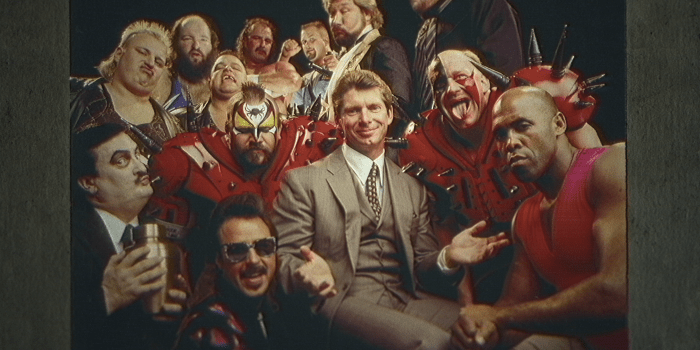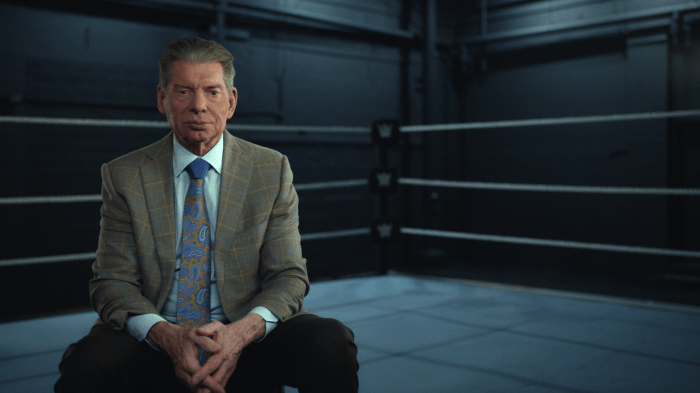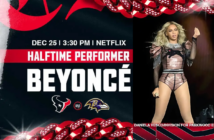Netflix’s Mr. McMahon documentary is a scathing six-part look into the life of Vince McMahon, co-founder and former chairman of World Wrestling Entertainment. The docuseries explores McMahon’s 40-year-plus reign as the most powerful man in pro wrestling, including his long history of scandals from steroid trials to the sex trafficking allegations that effectively ended his career. The doc ends with a question about McMahon’s legacy, and while some find it difficult to parse out the separation from Mr. McMahon the character, Vince the genius, and the man detailed in the assault allegations, an oft-overlooked part of McMahon’s story is that of someone who spent his entire career perpetuating harmful racial stereotypes for mass consumption.
At the 2005 WWE Survivor Series event, McMahon scripted himself to walk backstage and approach then-champion John Cena. Cena, who is white, was in the midst of transitioning out of his rapper gimmick into a more universally marketable G.I. Joe-like superhero. McMahon wanted to still allude to the rapper gimmick, so they had this exchange:
McMahon: What’s good in the ’hood?
Cena: Just holding it down, trying to take care of business.
McMahon: Keep it up, my n—a.
Related Story
A crowd chanted ‘He’s gay’ at wrestler Anthony Bowens — and it was heartwarmingRead now
McMahon then walked right past Black wrestlers Booker T and Sharmell, who reacted in utter shock. But they didn’t retaliate. They didn’t even ever acknowledge the moment ever again. It was a one-off for comedy that just seemed like an excuse for McMahon to say the N-word undeterred on pay-per-view. If you want to see the video, you have to look on YouTube as it has been scrubbed from the Survivor Series replay that’s streaming on Peacock. By the time McMahon had decided he’d air that skit, he’d already been responsible for decades of painfully insensitive moments with nonwhite on-screen acts.
Wrestling, at its heart, is about exaggerating someone’s most base characteristics and creating caricatures. For instance, if someone is playing a plumber, the character walks to the ring with a plunger. If the wrestler is patriotic, the character carries the flag to the ring. And if the wrestler is from a marginalized community, that will often become what the person is defined by. To this end, McMahon has masterminded some truly degrading characters.
There was Saba Simba, a Black man supposedly from Africa who came to the ring with a spear and danced wildly in the ring. There was a Black tag team duo called Cryme Tyme who robbed and scammed. There was Kamala, the Ugandan Giant who didn’t originate with McMahon, but was featured prominently on WWE television as a savage cannibal. There was also Shelton Benjamin’s “momma,” a mammylike figure who was attached to a Black Olympic wrestler for no reason. And Virgil, the Million Dollar Man’s voiceless servant who did his bidding. And the list could go on for days.
 WWE co-founder Vince McMahon (center) with wresters and wrestling personalities.
WWE co-founder Vince McMahon (center) with wresters and wrestling personalities.
Netflix
That doesn’t account for the other communities that were exploited, such as the “Mexicools,” who came to the ring on the back of a lawnmower; Kai En Tai, the Japanese wrestlers who had a castration plot line for laughs; the Billy & Chuck “gay wedding;” and a slew of insulted ethnic groups and nationalities along the way.
It’s been frustrating to be a wrestling fan for most of McMahon’s reign, with just about every popular Black star he’s ever had being uber-talented wrestlers who had to overcome insulting gimmicks and angles. The company’s most popular Black male wrestlers of the past decade, The New Day, reached their level of fame only after finding a way to navigate past McMahon’s original idea of them being Baptist preachers. One member, Kofi Kingston, would go on to win the WWE championship in 2019. The win made him only the fourth Black WWE champion in the company’s history (since then Bobby Lashley and Big E have also won WWE championships). The match made Kingston the first Black man to even compete for the title in six years. He’d go on to lose the belt to Brock Lesnar in eight seconds, in embarrassing fashion a few months later in January 2020.
Related Story
 The Rock’s wrestling return succeeded, thanks to his career-long ability to adaptRead now
The Rock’s wrestling return succeeded, thanks to his career-long ability to adaptRead now
Race does come up in one fleeting moment in Mr. McMahon, courtesy of Dwayne “The Rock” Johnson, who, in 1998, became the first WWE champion “of color,” as he put it. Johnson spoke about his conversations with McMahon about race.
“I’m the first WWE champion of color,” Johnson remembers telling McMahon. “And [McMahon] says, ‘I know, but I don’t see color.’ Vince … was always about ‘I don’t care what color you are. You could be Black, green and purple … as long as you are drawing money, you will be champion.’ ” What Johnson fails to convey, however, is that so much of what draws money to the WWE depends on the way wrestlers are written and how McMahon decides to portray them on television. For every success story of a Black wrestler, there are a handful of other atrocious stories about those who didn’t make it.
McMahon’s legacy is one of a man who, yes, was innovative in entertainment and pro wrestling. But the headline now is about the terrible accusations of assault and sex trafficking that are synonymous with his power and fame. For me, he’s always been someone who has contributed to thousands of hours of denigrating, racist storylines and portrayals of marginalized groups on his airwaves. The harm his storylines perpetrated can’t be ignored when discussing what McMahon means. And it should also reflect on the greatness of every Black, Latino and queer performer to have to overcome McMahon’s machinations to survive in his company, let alone find ways to thrive.
David Dennis Jr. is a senior writer at Andscape, and the author of the award-winning book “The Movement Made Us: A Father, a Son, and the Legacy of a Freedom Ride.” David is a graduate of Davidson College.



